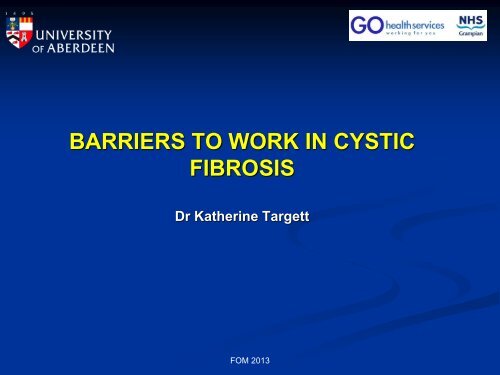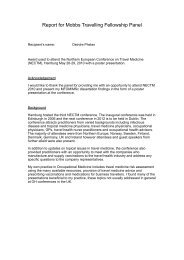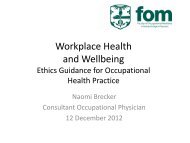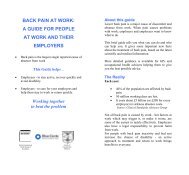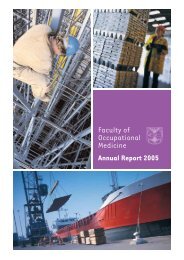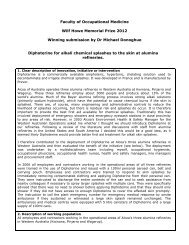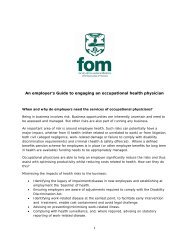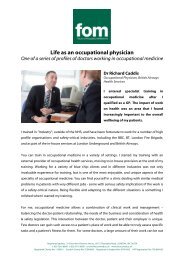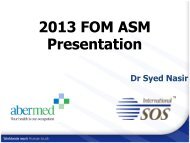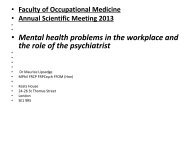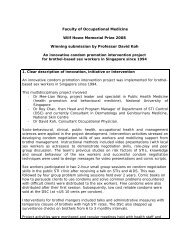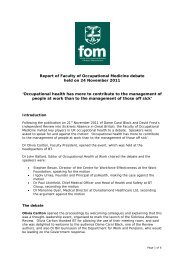Dr Katherine Targett - Faculty of Occupational Medicine
Dr Katherine Targett - Faculty of Occupational Medicine
Dr Katherine Targett - Faculty of Occupational Medicine
Create successful ePaper yourself
Turn your PDF publications into a flip-book with our unique Google optimized e-Paper software.
BARRIERS TO WORK IN CYSTIC<br />
FIBROSIS<br />
<strong>Dr</strong> <strong>Katherine</strong> <strong>Targett</strong><br />
FOM 2013
CYSTIC FIBROSIS<br />
• Commonest fatal inherited disease in Caucasian populations <strong>of</strong><br />
European origin<br />
• Autosomal recessive inheritance<br />
• In the UK: Gene frequency is 1 in 25<br />
Incidence 1 in 2,500 births<br />
First described by Anderson in 1938. But……<br />
Rochholz 1857, Almanac <strong>of</strong> children’s songs from Switzerland<br />
‘The child will soon die whose brow tastes salty when kissed’<br />
FOM 2013
Molecular genetics<br />
Gene localised to long arm <strong>of</strong> chromosome 7 in 1985<br />
Gene locus isolated in 1989<br />
Gene product:<br />
Cystic Fibrosis Transmembrane Conductance Regulator (CFTR)<br />
FOM 2013
CFTR<br />
CFTR Apical (luminal) membranes <strong>of</strong><br />
Airways<br />
Pancreas<br />
Liver<br />
Intestine<br />
Sweat glands<br />
FOM 2013
CF IN ADULTS<br />
CLINICAL<br />
PSYCHOSOCIAL<br />
80% recurrent pulmonary<br />
infections and pancreatic<br />
insufficiency<br />
15% recurrent pulmonary<br />
infections<br />
5% gastrointestinal problems<br />
only<br />
Diabetes, liver disease,<br />
osteoporosis, fertility<br />
Schooling and educational<br />
attainment<br />
Parental attitudes and<br />
expectations<br />
Emotional and psychological<br />
development<br />
Mental health issues<br />
FOM 2013
EPIDEMIOLOGY<br />
Survival<br />
1930’s 1-2 years<br />
1969 (USA) 14 years<br />
1978 (USA) 21 years<br />
1990 (USA) 28 years<br />
1994 (UK) 31 years<br />
Estimated survival <strong>of</strong> CF patient<br />
born in 1990s >40 years<br />
Adults > children<br />
Improved survival: antibiotics, nutrition<br />
FOM 2013
EMPLOYMENT<br />
AND CYSTIC FIBROSIS<br />
Aim<br />
To evaluate which physical and psychosocial factors are<br />
associated with employment status <strong>of</strong> adults with CF<br />
FOM 2013
EMPLOYMENT<br />
AND CYSTIC FIBROSIS<br />
• Multicentre study (Aberdeen, Birmingham and Newcastle)<br />
• Adults with CF age 16 years and over<br />
• Questionnaires:<br />
• Health-related quality <strong>of</strong> life, CFQ-UK. 12 QoL domains: physical,<br />
role, vitality, emotional, social, body image, eating, treatment burden,<br />
health perceptions, weight, respiratory and digestive symptoms<br />
• Working with CF<br />
• Presenteeism – Stanford Presenteeism Scale (SPS)<br />
• Clinical markers <strong>of</strong> disease severity:<br />
FEV 1 %; BMI<br />
Colonising organism in sputum;<br />
CF-related diabetes;<br />
Courses <strong>of</strong> IV antibiotics in preceding year<br />
Transplant status<br />
FOM 2013
POPULATION<br />
Median age 26yrs old<br />
(range 16-70)<br />
Female 46%<br />
Education “school only”<br />
60%<br />
254<br />
subjects<br />
Mean FEV 1 % predicted 60%<br />
(range 12-136%)<br />
Mean BMI 22<br />
Colonising organism Ps.<br />
Aeruginosa in 74%<br />
Median number <strong>of</strong> courses <strong>of</strong><br />
IV antibiotics in preceding<br />
year = 2<br />
CF-related diabetes 34%<br />
Transplant (lung or liver) 5%<br />
FOM 2013
EMPLOYMENT STATUS<br />
• 30% unemployed <strong>of</strong> whom 24%<br />
seeking work<br />
• Median hours worked = 37hrs/wk<br />
FOM 2013<br />
• Mean SPS score = 25<br />
“My CF does not affect my ability to do<br />
the work I am asked to do, but a few<br />
employers that I have told about my<br />
CF have then said that they have<br />
found someone more suitable and<br />
are not willing to give me a chance or<br />
any support. I have not had any paid<br />
work since I left school”
40% stopped a job because <strong>of</strong><br />
their CF<br />
24% changed duties because <strong>of</strong><br />
CF<br />
10% taken a cut in salary<br />
because <strong>of</strong> CF<br />
WORK DISABILITY<br />
42% had received advice<br />
regarding work – most from their<br />
respiratory consultant and only<br />
6% from occupational health<br />
92% were allowed time <strong>of</strong>f for<br />
appointments;<br />
30 % had their hours adjusted<br />
47% CF influenced choice <strong>of</strong><br />
career<br />
54% were allowed to work flexibly<br />
23% discrimination because <strong>of</strong><br />
CF<br />
17% were allowed to work from<br />
home<br />
FOM 2013
DIFFERENCES BETWEEN CENTRES<br />
• Birmingham recorded consistently lower CFQ-UK<br />
scores<br />
• Most likely to be in work in Birmingham; least likely in<br />
Newcastle<br />
• Statistically significant between centre difference in<br />
presenteeism scores: highest in Aberdeen, lowest in<br />
Birmingham.<br />
• For those not currently in paid employment Newcastle<br />
had the lowest percent “ever worked and currently<br />
seeking employment”, Aberdeen the most<br />
FOM 2013
PREDICTORS OF EMPLOYMENT<br />
STATUS (univariate analysis)<br />
Centre<br />
Gender (p=0.011)<br />
FEV 1 % (p
QUALITY OF LIFE<br />
Physical<br />
Role<br />
Vitality<br />
Emotion<br />
Social<br />
Body<br />
Eat<br />
Treat<br />
Health<br />
Weight<br />
Respiratory<br />
Digestion<br />
Unemployed<br />
0.00 2.00 4.00 6.00 8.00 10.00 12.00 14.00<br />
Employed<br />
1.00<br />
1.25<br />
1.50<br />
1.75<br />
2.00<br />
2.25<br />
2.50<br />
CFQ-UK QoL domains<br />
ratio employed: unemployed<br />
FOM 2013
PREDICTORS OF EMPLOYMENT<br />
Best fit model (ROC 0.856)<br />
• Education<br />
• Role perception<br />
• Health perception<br />
• Centre<br />
STATUS<br />
(multivariate analysis)<br />
• Does not include any recognised markers <strong>of</strong> disease severity<br />
FOM 2013
THE FUTURE<br />
• Strategies to improve coping strategies and resilience<br />
• Psychological interventions<br />
• Targeting the paediatric population<br />
• Role for occupational health advice in out-patient clinics<br />
“I find working to be therapeutic. I also find that however tiring it is to<br />
work, the structure <strong>of</strong> the work day helps me better plan and carry<br />
out my treatments at regular intervals. I would hate to think what I<br />
would have missed out on if I had never worked, my life would have<br />
been all about CF……I find work normalises me and I don’t think<br />
about CF all day”<br />
FOM 2013
WITH THANKS TO<br />
Pr<strong>of</strong>essor Graham Devereux, Aberdeen Royal Infirmary<br />
<strong>Dr</strong> Ed Nash, Birmingham Heartlands Hospital<br />
<strong>Dr</strong> Steve Bourke, Royal Victoria Infirmary, Newcastle upon Tyne<br />
Society <strong>of</strong> <strong>Occupational</strong> <strong>Medicine</strong>, Scottish Group, Sandy Elder Award 2010<br />
All the patients from Aberdeen, Birmingham and Newcastle who took part in<br />
this study<br />
FOM 2013


